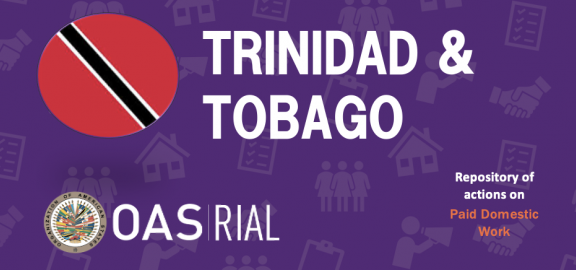Trinidad & Tobago - Repository of Actions on Paid Domestic Work
| Regulatory Information | |
| Ratification of the 189 ILO Convention | No. |
| Existence of an internal regulation for domestic work |
Minimum Wages Acts and Orders.
Minimum Wages (Household Assistant) Order. Consult here.
Maternity Protection Act. Consult here. |
| Areas of intervention | |
| 1.Training and professionalization | The Labour Inspectorate Unit (LIU) participated in a training workshop organized by the International Labour Organization (ILO) and the National Union for Domestic Employees (NUDE) in 2018. Information was shared about the rights of domestic workers in order to empower them with knowledge of their rights and the employer’s responsibility in the workplace. |
| 2. Dissemination and awareness- raising |
1. Collaboration with the National Union for Domestic Employees (NUDE) to develop awareness campaigns.
2. Establishment of a Domestic Workers Register and Campaign in 2015 as follows:
3. In November 2016, the Ministry’s Corporate Communications Unit (CCU) launched the first phase of its “Cherish, Respect, Appreciate Us” Domestic Workers’ Sensitisation Campaign. This comprised the airing of two (2) radio advertisements on six (6) radio stations which highlighted the importance of the role of domestic workers.
4. “Domestic Work is Work Too” Campaign (2017):
Three (3) Outreach Activities which featured ‘dance flash mobs’ were conducted in collaboration with the NUDE, a dance company and a local influencer who was the host. The Activities were hosted to raise public awareness about the rights of domestic workers.
5. Information brochures were developed and distributed at these Outreach Activities.
6. Airing of a “Domestic Work is Work Too” video feature (which captured these activities) on television. The video was also shared on the Ministry of Labour’s social media.
7. Airing of Testimonial Videos which featured three (3) domestic workers; they shared their experiences on their roles and duties as well as on the pride they feel in the performance of their duties. A video testimonial from an Employer was also produced on the value he places on his Domestic Worker.
These were aired on the following locations:
8. Design and distribution of posters on domestic workers were also developed and placed in national Water Taxis and the national bus terminals, and they were distributed in the following Public Offices/Agencies:
- Health Centres, Elections and Boundaries Commissions, National Libraries and Government Ministries/Agencies, Licensing Offices, Ministry of Legal Affairs Registration Offices, Occupational Safety and Health Agency (OSHA), National Entrepreneurship Development Company (NEDCO), Cipriani College of Labour and Co-operative Studies Offices.
2022
9. Redesign of Brochures and launch of electronic versions on the Ministry of Labour’s social media pages and website. |
| 3. Inspection | The LIU has maintained a Domestic Register, where ninety-eight (98) domestic workers are registered. Complaints from domestic workers resulted in Labour Inspectors making one hundred and thirteen (113) visits to resolve the disputes. This led to the recovery of arrears in the sum of one hundred and thirty thousand and fifty-three dollars and sixty-four cents (TTD$130,053.64) for the period 2012 to 2022. |
| 4. Social Security Coverage | Domestic workers must make the required contributions. |
| 5. Alliances with social actors | N/a |
| More information | |
|
The Labour Inspectorate Unit (LIU) is the monitoring and enforcement arm of the Ministry of Labour with responsibility for compliance with the Minimum Wages Act, Chapter 88;04, 1976 and other Sectoral Orders as well as the National Minimum Wages Order 2014 (as Amended in 2019), the Maternity Protection Act, 1998 and Children Act 2012 (Part XIV – Employment of Young Persons).
Labour Inspectors investigate complaints and conduct routine inspections to monitor compliance with the minimum wage and other terms and conditions of work; hours of work and overtime; public holidays; meal and rest periods; employment of children and child labour and maternity protection. The wages and terms and conditions of work for domestic workers are protected by legislation through the Minimum Wages Order 2014 (as amended in 2019), Minimum Wage (Household Assistant) Order 1991 and the Maternity Protection Act 1998.
Domestic workers, including migrant domestic workers, can lodge complaints with the LIU for investigation relating to the minimum wage, other terms and conditions of work, including overtime rates, vacation and sick leave as well as maternity leave. Domestic workers can also join a Trade Union to report a dispute and have access to the Industrial Court for determination of their issues. In fact, Trinidad and Tobago has a Trade Union called the National Union for Domestic Employees (NUDE) which is dedicated to ensuring decent work for domestic workers.
Under the Minimum Wages Act, Labour Inspectors are authorised to enter business places. However, because domestic workers work in private homes, this poses a challenge for Inspectors to pro-actively monitor their work conditions except when a complaint is made.
The Labour Inspectorate Unit together with the Corporate Communications Unit conducted a number of activities to raise awareness about decent work for domestic workers:
a) Collaboration with the National Union for Domestic Employees to develop awareness campaigns; b) Establishment of a Domestic Workers Register; c) Three (3) ‘flash mobs’ to raise public awareness about the rights of domestic workers; d) Radio and Television advertisements; and e) Information brochures were developed and distributed.
The recovered arrears - referred to in the table above - represent outstanding wages, overtime, vacation leave and maternity leave. |
|




